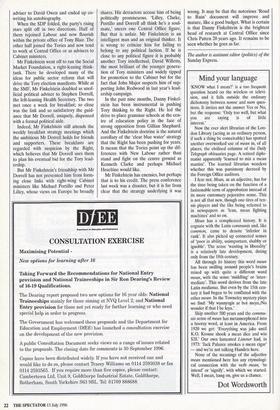Mind your language
'KNOW what I mean?' is a too frequent question heard on the wireless or televi- sion, and it falls outside the ordinary dichotomy between nonne and num ques- tions. It invites not the answer Yes or No, but the response: 'Only too well, but what you are saying is of little interest.'
Now the ever alert librarian of the Lon- don Library (acting as an ordinary person, if such a thing be conceivable) has spotted another overworked use of mean in, of all places, the civilised columns of the Daily Telegraph obituaries page. A retired diplo- matist apparently 'learned to mix a mean martini'. The learned librarian wonders whether this was parsimony decreed by the Foreign Office auditors.
I fear not. Mean, as an adjective, has for the time being taken on the function of a fashionable term of approbation instead of its more customary pejorative sense. This is not all that new, though one tires of ten- nis players and the like being referred to in newspapers as 'lean, mean fighting machines' and so on.
Mean has a complicated history. It is cognate with the Latin communis and, like common, came to denote 'inferior in rank'. It also picked up connected senses of 'poor in ability, unimportant, shabby or ignoble'. The sense 'wanting in liberality' is a relatively late development, dating only from the 18th century.
All through its history this word mean has been swilling around people's brains mixed up with quite a different word mean, with the sense 'middling' or 'inter- mediate', This word derives from the late Latin medians, But even by the 15th cen- tury it had begun to be conflated with the other mean. In the Towneley mystery plays we find: 'My wynnyngis ar bot meyn,/No wonder if that I be leyn.'
Skip another 500 years and the commu- nis sense of mean has metamorphosed into a hooray word, at least in America. From 1920 we get: 'Everything was jake until K.O. Krouse shook a mean dice and win $28.' Our own lamented Listener had, in 1973: 'Jack Faience smokes a mean cigar' — and we're not talking Hamlets here. None of the meanings of the adjective mean mentioned here has any etymologi- cal connection with the verb mean, `to intend' or 'signify', with which we started. Well, I mean, hang on, give us a chance.
Dot Wordsworth


































































 Previous page
Previous page